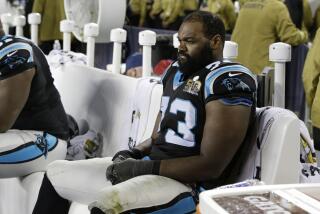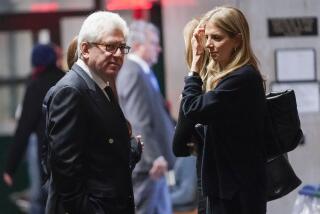‘Air Force One’ Hijacked Script, Writers Say
- Share via
“Air Force One” is raking in megabucks as the nation’s top box office draw, and a Gulf War veteran and his sister are making a federal case out of it.
John Celli, a former helicopter mechanic, and his sister, Katherine, claim in a lawsuit in U.S. District Court that one of AFO’s producers hijacked their original idea for a film in which terrorists take over the president’s plane.
The Cellis alleged in their suit that they approached Beacon Productions in February 1995 but “were informed that the project was not what Beacon Pictures was looking for at that time.”
The suit alleges that Beacon then turned around and stole their idea.
Their lawyer, Steven Kramer, alleged that the similarities between the Celli’s original script and the picture “are incredibly striking.”
“Air Force One” went into development about the same time the Cellis met with Beacon producer Marc Abraham regarding their script, called “Final Exam,” the suit states.
“Unfortunately, in our business this has become an undesirable sign of success,” Abraham, executive producer and president at Beacon, said in a prepared statement. He added that his company’s policy is “not to comment on any litigation.”
Here are some of the things the Cellis say came right from their script:
* The film is about terrorists attempting to kidnap the president aboard the presidential plane. It was filmed on a sound stage with very few location shots, and the plane was a character. The Cellis claim they registered their copyright for this idea in February 1995 and pitched it a few days later to Beacon.
* The vice president in the film is named Katherine Chandler--a name similar to Katherine Celli’s.
* Both the film and the Cellis’ script involve using a cable in a last-ditch midair rescue as the plane runs out of fuel. In both, six people die after falling out of the plane without parachutes. The plane blows up at the end, but the president is saved and everybody cheers.
Attorney Kramer said he plans to ask a judge this week to order the producers to give the Cellis a writers’ credit, and to appoint a receiver to hold in escrow any money his clients may have coming to them.
AWAY GAME: Dodger pitcher Hideo Nomo is suing the wife of San Diego Padre Tony Gwynn for selling his likeness and picture to a Japanese company that made and sold Hideo Nomo jigsaw puzzles without permission. Now, it looks like the case will be heard on Gwynn’s home playing field.
Nomo filed the suit in June in Los Angeles Superior Court, seeking the $465,000 he claimed Alicia Gwynn made from misappropriating his likeness, plus $1 million in punitive damages. Nomo alleged that Alicia Gwynn misrepresented herself to a Japanese company as a friend of the pitcher’s agent, and that the agent had given her permission to market his likeness.
According to court files, attorneys for both sides have agreed to move the case to San Diego, where Gwynn lives and her sports marketing company, A. G. Sport Inc., is located.
The lawyers--Jean Afterman for Nomo and Janice Brown for Gwynn--plan to ask Superior Court Judge Ronald M. Sohigian to approve the transfer Monday.
“All the parties are making a very respectful effort to resolve the case,” Brown said.
SAME OLD SONG: A New York music company is asking a Superior Court judge in Los Angeles to review a 47-year-old case and declare that the wife of composer Sam Coslow is no longer entitled to royalties from the 1960s Dean Martin hit “Everybody Loves Somebody.”
Coslow, who died in 1982, got his start on Tin Pan Alley, and some of his songs became well-known standards for such artists as Bing Crosby, Billie Holliday, Ella Fitzgerald, Duke Ellington and Spike Jones. He even won an Academy Award as the producer of a short film featuring Groucho Marx and Carmen Miranda.
At issue is an agreement reached between Coslow and two lyricists in 1950 to split royalties from “Everybody Loves Somebody.” A court fight determined that Coslow wrote the melody during the 1920s, only he called his song “Midnight Moon.” Ken Land and Irving Taylor penned the now-familiar lyrics.
Sands Music Corp., which according to the suit obtained “Everybody Loves Somebody” from Sinatra Songs Inc., claims that the copyright to “Midnight Moon” expired on Dec. 31, 1995. Therefore, the company no longer wants to pay royalties to Coslow’s heirs.
But the copyright held by the two lyricists still has years to go, and Coslow’s daughter thinks it’s unfair that two men who slapped some words onto her father’s song should receive all the royalties.
But fair or unfair, “that’s the way we interpreted the agreement,” said Sands’ lawyer, David S. Olson. “We’re just asking the court to tell us what to do.”
Coslow’s daughter, Cara, says the copyright’s clock should have started ticking for everyone in 1950--when they signed the agreement splitting the royalties.
“They took a song and attached different lyrics to it,” Coslow said. “I could add lyrics to ‘Rhapsody in Blue’ tomorrow and it would still be ‘Rhapsody in Blue.’ ”
Coslow, who is director of casting at Carsey-Werner in Studio City, insisted that everyone is still singing the same old song. “I can give you all our records,’ she said. “I’ll show you the sheet music. I’ll even hum a few bars for you.”
As for “Everybody Loves Somebody,” its latest incarnation was as a jingle for Western Union commercials. The lyrics went something like this: “Everybody needs some money sometime.” Try singing that to “Rhapsody in Blue.”
SON OF SLANDER: “All in the Family” had its spinoffs--”The Jeffersons” and “Maude” come to mind. Now, the Carroll O’Connor slander trial has its own spinoff. William Schneid, a drug counselor who was a witness in songwriter Harry Perzigian’s slander case against O’Connor, sued Perzigian’s lawyer last week for calling him a liar.
Schneid, a witness for O’Connor, contended that attorney Allan A. Sigel was malicious in arguing that his testimony was untruthful. He is seeking $10 million in punitive damages, the same sum Perzigian sought from O’Connor.
The O’Connor suit ended last month when a jury unanimously found that the actor had not slandered Perzigian or caused him emotional distress by calling him a “sleazeball” and “partner in murder.” O’Connor made the remarks in the wake of the 1995 suicide of his son, Hugh, who obtained cocaine from Perzigian.
Schneid testified during the slander trial that Perzigian told him he was Hugh O’Connor’s cocaine “connection” and “made some money” from selling drugs to his friends.
As the case drew to a close, Sigel, like any litigator in the heat of battle, attacked the credibility of potentially damaging testimony. The lawyer says he can’t remember saying anything disparaging about Schneid, and even if he did, his speech is protected because his comments were made in court.
“If a client brought me this case, I would say, ‘This is a joke. You have absolutely nothing to worry about,” Sigel said. “I would be surprised if it ever saw a courtroom.”
ENQUIRING MINDS: Eddie Murphy not only dropped his $5-million libel suit against the National Enquirer last week, he wound up covering the supermarket tabloid’s legal fees, Enquirer lawyers said. The amount Murphy paid was not disclosed. But it seems that the man who played “The Nutty Professor” is but the latest celeb to learn, the pricey way, of the perils of pursuing the tabloids in the courts lately.
Last month, Kato Kaelin was ordered to pay another tabloid, the Globe, $25,000 in legal fees after his libel suit was tossed out of court. Kaelin ate the tabloid’s legal tab under another legal measure originally meant to prevent deep-pocket corporations from silencing citizens with expensive nuisance lawsuits.
Murphy’s suit involved an article in the May 20 Enquirer under the headline “Eddie Murphy’s Secret Sex Life--His Transvestite Hooker Tells All.” You get the drift. He also reached an earlier settlement with the Globe in a similar suit over similar subject matter.
A statement by Murphy’s publicist, Arnold Robinson, said that the “Beverly Hills Cop” star investigated and “has concluded that the National Enquirer did not publish its article about Mr. Murphy with malice or recklessly.” It pointed out that the tabloid made no payment to Murphy.
The tabloid happily reported that it received payment from Murphy.
“It’s very nice to get a check from Eddie Murphy,” said Enquirer editor Steve Coz. “It sort of makes us feel we’re fighting the good fight.”
The tabloid’s lawyer, Gerson A. Zweifach, agreed: “You can’t win bigger than that when you’re defending a lawsuit--to have the other guy agree to go away and pay your fees. It’s a happy day in the tabloid wars.”
Murphy’s lawyer, Martin D. Singer, was on vacation and could not be reached.
More to Read
Only good movies
Get the Indie Focus newsletter, Mark Olsen's weekly guide to the world of cinema.
You may occasionally receive promotional content from the Los Angeles Times.










